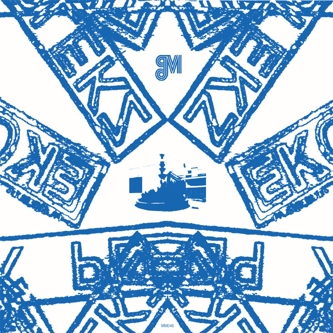The charm of analogue equipment lies in its unpredictability. Most modern soft-synths and sequencers are so unerringly accurate, so spot-on in their reproduction and identical on repeat that it’s nigh-on impossible to generate anything approaching spontaneity while using them. Old, beaten up machines, their circuitry a little fried in places and fraying in others, never quite sound the same twice – each time a signal is routed through their copper wires something a little different comes back, modulated by a subtle design quirk or an acquired trait. This application of the laws of chaos to music making often results in something that a lot of modern electronic music lacks: character. And while there’s admittedly no substitute for a good compositional ear, a good analogue set-up can project an awful lot of personality by itself.
Bristol’s Ekoplekz has both. As a key component in the city’s electronic music scene over the past few years, firstly as scene commentator/blogger Gutterbreakz, and now as musical contributor in his own right, he unsurprisingly taps into its soundsystem lineage, running all the way from dub and reggae through to today’s explosion of dubstep forms. But his own sound is quite distant from the digital sheen of many of his current contemporaries – he explores the possibilities of a weather-beaten analogue set-up, routing signals though a mass of cables and decaying machines and taking advantage of, rather than attempting to hide, their inherent flaws. The results often appear to sprawl, as on last year’s debut 12" for Punch Drunk, ‘Stalag Zero’, where a single apparently infinite loop is allowed to run for seven-odd minutes under gradually ascending drifts of synth. Rather like the dub-tech experiments of Punch Drunk label boss Peverelist, playing one of Ekoplekz’s tracks is like dropping the needle at an arbitrary point on a far longer record. When it ends, it does so with the sneaking suspicion that the loop carries on indefinitely, having merely dropped out of earshot.
Despite an initially forbidding sound palette, all harsh edges and flickering moments of dissonance, his music never lacks for melody, and is often surprisingly accessible. His debut full-length for Mordant Music, Memowrekz, admittedly displays abrasive, borderline sadistic tendencies (the fried and overdriven ‘Major Malfunction’, the cut-up audio detritus of ‘Toxic Shock’) but they’re far outnumbered by many moments of sublime, dubbed-out beauty. ‘Bromley Heath Special’ is an early highlight, its jazzy trumpet line buffeted by the gale force winds that tear across its surface. Later on, ‘Greenways Park’ is eerily placid despite the atonal stabs of percussion that serve as its rhythmic backbone, overlaid by a series of descending chords reminiscent of Aphex Twin’s prettier work or Chris Clark circa Body Riddle.
But the single element that underpins Memowrekz more than any other, implicit in its use of studio equipment to transform base sounds into resonant spaces, is the spirit of dub. At times Ekoplekz’s music feels like a chaotic, homegrown equivalent to the elegant experiments of Vladislav Delay (or his work as part of the Moritz Von Oswald Trio), and at others it sounds like a further step in the post-punk lineage stretching from PiL through the darker realms occupied by This Heat and Cabaret Voltaire. Rather than being an evolutionary step forward though, it’s more of a parallel branch, having diverged from the main lineage some time ago and adapted under its own volition. It’s certainly distinctly British, both in its knowing sense of humour and in the fact that it appears to contain its own weather system – its muted greys and muggy atmosphere are reminiscent of low clouds and drizzle. But, unlike a lot of his current UK electronic contemporaries, who seem content to remain in either locale exclusively, his music is equally urban and rural. ‘Fixation’ and ‘The Sinister Sponge’ both conjure up the same images of decaying tower blocks that have come to be stereotypically associated with Burial and the dubstep set; ‘Carmarthen Fields’ and ‘Ferry Across The Severn’ are, as their names suggest, far more pastoral, recalling the watery electronics of 10-20’s excellent Landforms series of EPs.
At 35 songs and nearly two hours long, Memowrekz might initially seem offputting in terms of sheer size, but it’s impressive precisely because it’s so easy to absorb. Its sketch-like individual components lend themselves to listening in small chunks, something its original release on cassette seems to encourage. And its release on the reliably fascinating Mordant Music makes sense – the label’s blend of wracked electronics, melody and (in many cases) fuzzily recorded old samples has been among the most interesting and melodically fulfilling of the musicians and collectives oft lumped under the ‘hauntology’ bracket. Ekoplekz fits neatly into its roster, all the way down to his vaguely tongue-in-cheek track titles, his album’s release on cassette, and the uneasy ‘ghost in the machine’ feel of his compositions (‘Ekotrakz (Version)’ literally sounds as though he could have walked out of the room and left his equipment to write the track). Alongside occasional labelmate Shackleton, he’s transformed a similar set of influences into something quite different, and subtly powerful.


